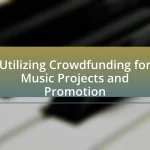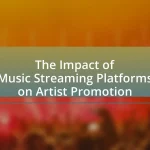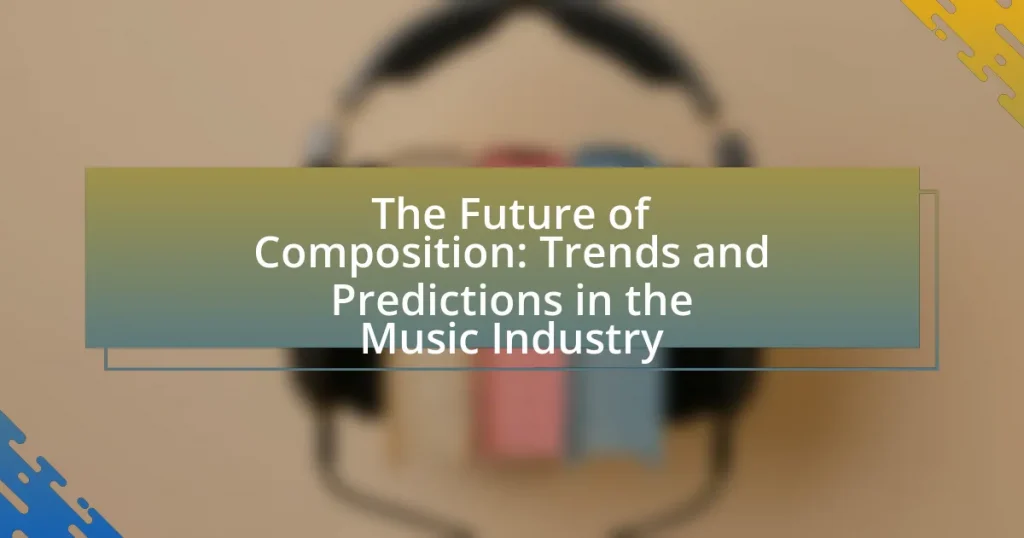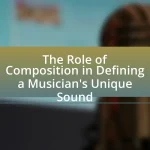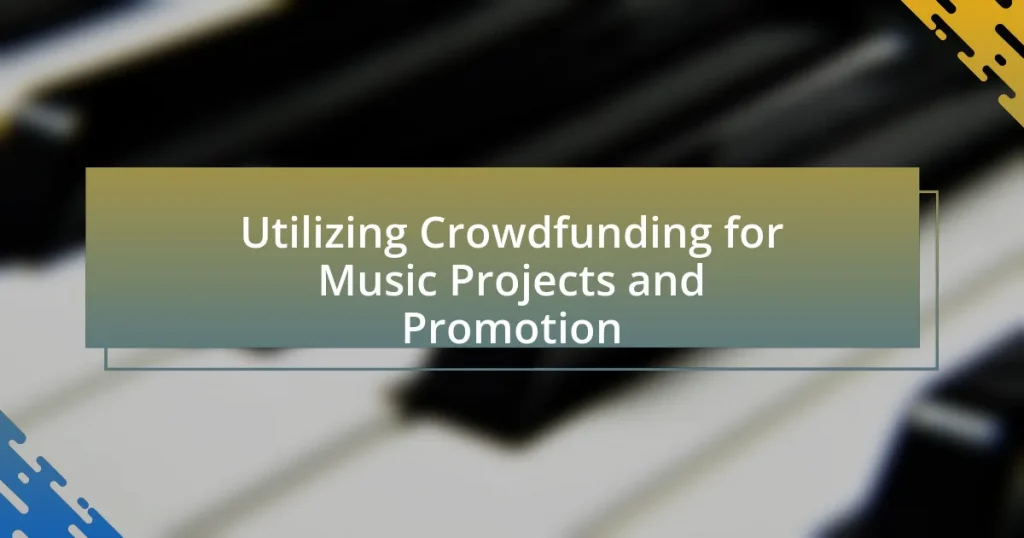The article focuses on the future of composition in the music industry, highlighting key trends such as the rise of artificial intelligence, the importance of cross-genre collaboration, and the influence of digital platforms on music distribution. It examines how technology, particularly digital audio workstations and AI tools, is reshaping the creative process and enabling composers to produce innovative works. Additionally, the article discusses shifts in music consumption driven by streaming services, the significance of audience engagement, and the emergence of new genres influenced by cultural diversity. It also addresses the evolving role of traditional music publishers and the impact of independent artists on the industry, while outlining the skills and strategies composers need to thrive in this changing landscape.
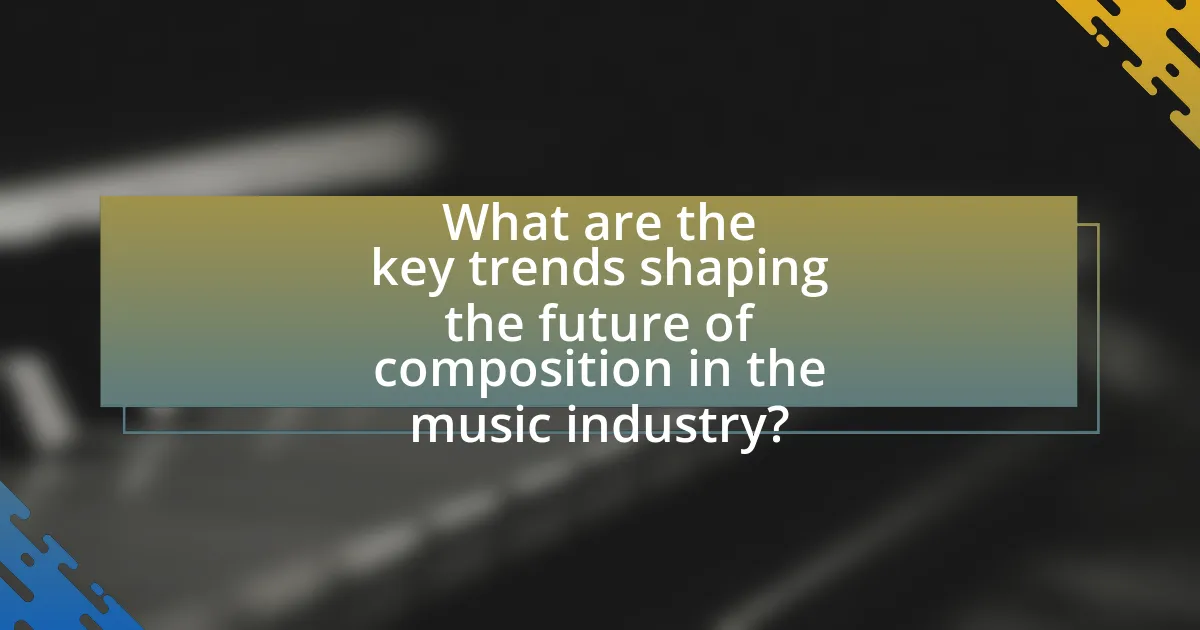
What are the key trends shaping the future of composition in the music industry?
Key trends shaping the future of composition in the music industry include the rise of artificial intelligence, the increasing importance of collaboration across genres, and the growing influence of digital platforms. Artificial intelligence is being utilized to create music, analyze trends, and assist composers in generating new ideas, as evidenced by AI tools like OpenAI’s MuseNet and Google’s Magenta. Collaboration across genres is becoming more prevalent, with artists blending styles to reach wider audiences, as seen in the success of genre-crossing collaborations like Lil Nas X’s “Old Town Road.” Additionally, digital platforms such as Spotify and YouTube are transforming how music is distributed and consumed, leading to new opportunities for composers to reach global audiences and monetize their work effectively.
How is technology influencing music composition?
Technology is significantly influencing music composition by providing tools that enhance creativity and streamline the production process. Digital audio workstations (DAWs) allow composers to create, edit, and mix music with unprecedented ease, enabling complex arrangements that were previously difficult to achieve. Additionally, software instruments and plugins offer a vast array of sounds and effects, expanding the sonic palette available to composers. For instance, the use of artificial intelligence in music composition, such as OpenAI’s MuseNet, demonstrates how algorithms can generate original compositions, suggesting new directions for creativity. This integration of technology not only accelerates the composition process but also democratizes music creation, allowing individuals without formal training to produce high-quality music.
What role do digital audio workstations play in modern composition?
Digital audio workstations (DAWs) are essential tools in modern composition, enabling musicians to create, edit, and produce music efficiently. DAWs provide a comprehensive platform for recording audio, arranging tracks, and applying effects, which streamlines the creative process. According to a 2021 survey by the International Music Producers Association, over 80% of music producers utilize DAWs as their primary means of composition, highlighting their significance in contemporary music production. This widespread adoption underscores the role of DAWs in facilitating collaboration, allowing artists to work remotely and share projects seamlessly, thus shaping the future of music composition.
How are artificial intelligence tools changing the creative process?
Artificial intelligence tools are transforming the creative process by enabling artists to generate, refine, and enhance their work more efficiently. These tools, such as AI-driven music composition software, allow musicians to explore new sounds and styles that may not have been possible through traditional methods. For instance, platforms like OpenAI’s MuseNet can compose original music across various genres, demonstrating AI’s capability to assist in the creative ideation phase. Additionally, AI algorithms analyze vast amounts of data to identify trends and preferences, helping artists tailor their compositions to audience tastes. This integration of AI not only accelerates the creative workflow but also expands the possibilities for innovation in music composition.
What shifts are occurring in music consumption and their impact on composition?
Shifts in music consumption include the rise of streaming services, which now dominate the market, leading to changes in how music is created and distributed. Streaming platforms like Spotify and Apple Music have altered revenue models, emphasizing single releases over albums, which influences composers to focus on creating catchy, short-form content that can capture listener attention quickly. Additionally, the accessibility of music production technology allows more artists to produce music independently, fostering diverse styles and experimentation in composition. This democratization of music creation has resulted in a broader range of influences and genres being incorporated into new compositions, reflecting the varied tastes of a global audience.
How do streaming platforms affect the way music is composed?
Streaming platforms significantly influence the way music is composed by prioritizing shorter song lengths and catchy hooks to enhance listener engagement. This shift is driven by algorithms that favor tracks with high replay value, leading composers to focus on creating music that captures attention quickly. For instance, a study by the University of Southern California found that the average song length has decreased from over four minutes in the 1990s to around three minutes today, reflecting the need for brevity in a streaming-dominated landscape. Additionally, the accessibility of data analytics on these platforms allows artists to tailor their compositions based on listener preferences, further shaping the creative process.
What is the significance of audience engagement in contemporary composition?
Audience engagement is crucial in contemporary composition as it directly influences the success and relevance of musical works. Engaged audiences provide immediate feedback, which composers can use to refine their art and connect more deeply with listeners. Research indicates that compositions that resonate with audiences tend to achieve higher streaming numbers and social media shares, demonstrating a tangible impact on a composer’s visibility and career trajectory. For instance, a study by the Berklee College of Music found that artists who actively engage with their audience through social media platforms see a 30% increase in fan retention and loyalty. This highlights the importance of audience interaction in shaping contemporary music trends and ensuring the longevity of compositions in a competitive industry.
What are the emerging genres and styles in music composition?
Emerging genres and styles in music composition include lo-fi hip-hop, ambient electronic, and fusion genres that blend traditional elements with modern technology. Lo-fi hip-hop has gained popularity for its relaxed beats and nostalgic samples, often used for studying or relaxation. Ambient electronic music focuses on creating atmospheric soundscapes, utilizing synthesizers and field recordings to evoke emotions. Fusion genres, such as jazz-hop and world music blends, incorporate diverse cultural influences, reflecting globalization in music. These trends are supported by the rise of digital platforms, which facilitate collaboration and distribution, allowing composers to experiment and reach wider audiences.
How are cultural influences shaping new musical genres?
Cultural influences are shaping new musical genres by integrating diverse musical traditions, styles, and social narratives into contemporary compositions. For instance, the rise of genres like reggaeton and K-pop illustrates how cultural elements from Latin America and South Korea, respectively, have merged with global music trends, creating unique sounds that resonate with wide audiences. Additionally, the incorporation of traditional instruments and rhythms from various cultures into modern music reflects a growing appreciation for global diversity, as seen in artists like Yo-Yo Ma, who blends classical music with folk traditions. This fusion not only enriches the musical landscape but also fosters cross-cultural dialogue, making music a powerful medium for cultural expression and innovation.
What role does collaboration play in the evolution of music styles?
Collaboration is essential in the evolution of music styles as it fosters innovation and the blending of diverse influences. When artists from different genres or backgrounds work together, they create unique sounds that can lead to the emergence of new musical styles. For example, the collaboration between hip-hop artists and rock musicians in the late 1990s resulted in the fusion genre known as nu-metal, which combined elements of both styles and gained significant popularity. This blending not only expands the creative possibilities for musicians but also reflects cultural exchanges that shape the music landscape. Historical instances, such as the collaboration between jazz musicians and classical composers, further illustrate how collaboration can lead to the development of entirely new genres, demonstrating its pivotal role in the ongoing evolution of music.
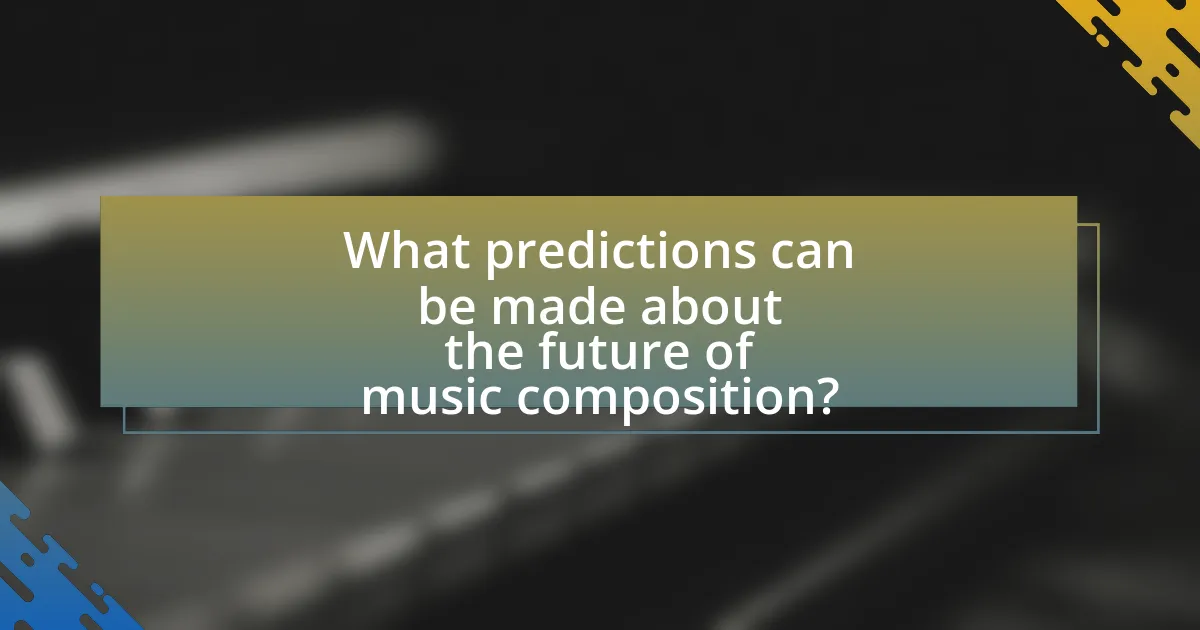
What predictions can be made about the future of music composition?
The future of music composition is likely to be dominated by advancements in artificial intelligence and technology, which will enable composers to create more complex and diverse musical works. AI tools, such as OpenAI’s MuseNet and Google’s Magenta, are already capable of generating original compositions, suggesting that human composers will increasingly collaborate with these technologies to enhance their creative processes. Additionally, the rise of virtual reality and immersive experiences will influence how music is composed and experienced, leading to new forms of interactive and multi-sensory compositions. The integration of data analytics will also allow composers to tailor their music to audience preferences, making compositions more personalized and engaging. These trends indicate a shift towards a more collaborative and technology-driven approach in music composition.
How will advancements in technology further transform music creation?
Advancements in technology will further transform music creation by enabling more sophisticated tools for composition, production, and distribution. For instance, artificial intelligence algorithms can analyze vast amounts of music data to generate original compositions, as demonstrated by AI systems like OpenAI’s MuseNet, which can create music in various styles. Additionally, virtual reality and augmented reality technologies are providing immersive environments for musicians to collaborate and perform, enhancing the creative process. The integration of blockchain technology is also revolutionizing how artists distribute their music and receive royalties, ensuring transparency and fair compensation. These technological innovations are reshaping the landscape of music creation, making it more accessible and diverse.
What future technologies are expected to emerge in music composition?
Future technologies expected to emerge in music composition include artificial intelligence, blockchain, and immersive audio technologies. Artificial intelligence will enhance creativity by generating music based on user inputs and preferences, as demonstrated by AI systems like OpenAI’s MuseNet and Google’s Magenta, which can compose original pieces in various styles. Blockchain technology is anticipated to revolutionize copyright management and royalty distribution, ensuring transparency and fair compensation for artists, as evidenced by platforms like Audius and Ujo Music. Immersive audio technologies, such as spatial audio and augmented reality, will create new listening experiences, allowing composers to craft multidimensional soundscapes that engage audiences in innovative ways.
How might virtual reality and augmented reality influence the composition process?
Virtual reality (VR) and augmented reality (AR) can significantly enhance the composition process by providing immersive environments that stimulate creativity and collaboration. These technologies allow composers to visualize their music in three-dimensional spaces, enabling them to experiment with soundscapes and arrangements in ways that traditional methods do not permit. For instance, a study by the University of California, Irvine, found that VR environments can lead to increased creative output by allowing users to interact with their compositions in a more engaging manner. Additionally, AR can facilitate real-time collaboration among musicians across different locations, as seen in applications like Spatial, which integrates AR tools for shared music creation. This integration of VR and AR into the composition process not only fosters innovation but also expands the possibilities for musical expression and collaboration.
What changes can we expect in the music industry’s structure?
The music industry’s structure is expected to undergo significant changes driven by technological advancements and shifts in consumer behavior. The rise of streaming platforms has already transformed revenue models, leading to a decline in physical sales and an increase in subscription-based income. According to the Recording Industry Association of America (RIAA), streaming accounted for 83% of the U.S. music industry’s revenue in 2022, highlighting this shift. Additionally, the emergence of decentralized platforms and blockchain technology may disrupt traditional distribution methods, allowing artists to retain more control over their work and earnings. This evolution is likely to foster a more direct relationship between artists and their audiences, further altering the landscape of the music industry.
How will the role of traditional music publishers evolve?
The role of traditional music publishers will evolve towards a more digital and collaborative model. As technology advances, traditional publishers are increasingly integrating digital platforms to distribute music, manage rights, and engage with artists directly. For instance, the rise of streaming services has shifted revenue models, prompting publishers to adapt by offering services that include data analytics and marketing support to help artists maximize their reach. Additionally, the growth of independent artists utilizing social media for promotion has led traditional publishers to focus on partnerships and co-publishing agreements, allowing them to remain relevant in a rapidly changing industry landscape.
What impact will independent artists have on the future of composition?
Independent artists will significantly democratize the future of composition by providing diverse musical perspectives and innovative approaches. As technology advances, independent artists increasingly utilize digital platforms for distribution, allowing them to reach global audiences without traditional gatekeepers. This shift fosters a more inclusive music landscape, encouraging experimentation and collaboration across genres. For instance, the rise of platforms like Bandcamp and SoundCloud has empowered independent musicians to share their work directly with listeners, leading to a surge in unique compositions that reflect varied cultural influences. Additionally, data from the 2021 Music Industry Report indicates that independent artists accounted for over 40% of global music consumption, highlighting their growing influence on composition trends.
What are the potential challenges facing composers in the future?
Composers in the future may face challenges such as the impact of artificial intelligence on creativity, the evolving landscape of music distribution, and the struggle for fair compensation. The rise of AI tools capable of generating music could lead to concerns about originality and the devaluation of human creativity. Additionally, the shift towards streaming services has altered how music is consumed, making it difficult for composers to monetize their work effectively. According to a 2021 report by the International Federation of the Phonographic Industry, only 12% of artists earn a sustainable income from streaming, highlighting the financial challenges composers may encounter.
How might copyright issues evolve with new technologies?
Copyright issues are likely to evolve significantly with new technologies, particularly through advancements in artificial intelligence, blockchain, and digital distribution. As AI-generated music becomes more prevalent, questions surrounding authorship and ownership will arise, challenging traditional copyright frameworks that typically recognize human creators. For instance, the U.S. Copyright Office has already indicated that works created solely by AI may not qualify for copyright protection, which could lead to a reevaluation of what constitutes an original work. Additionally, blockchain technology offers potential solutions for tracking ownership and usage rights, enabling more transparent and efficient management of copyrights. This evolution is further supported by the increasing prevalence of digital platforms that facilitate music sharing and distribution, which complicates enforcement of copyright laws and raises concerns about piracy and fair compensation for artists.
What are the risks of over-reliance on technology in music composition?
Over-reliance on technology in music composition can lead to a loss of creativity and originality. When composers depend heavily on software and algorithms, they may produce music that lacks emotional depth and personal expression, as technology often prioritizes formulaic structures over innovative ideas. Additionally, this dependence can diminish traditional skills, such as instrumental proficiency and music theory knowledge, which are essential for a well-rounded musical education. Studies have shown that musicians who engage less with traditional methods may struggle to develop their unique voice, as they become accustomed to the shortcuts provided by technology.
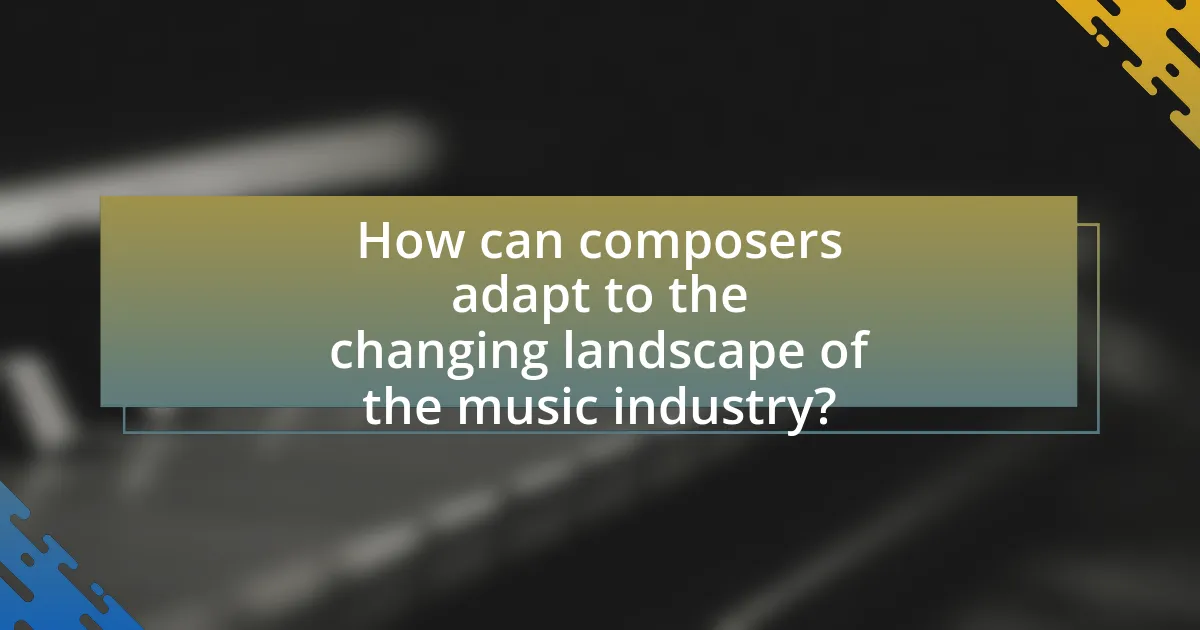
How can composers adapt to the changing landscape of the music industry?
Composers can adapt to the changing landscape of the music industry by embracing digital platforms and diversifying their revenue streams. The rise of streaming services has shifted how music is consumed, prompting composers to leverage platforms like Spotify and Apple Music for wider distribution. Additionally, composers can explore opportunities in licensing, sync placements, and collaborations with brands, which have become increasingly lucrative. According to the Recording Industry Association of America, streaming accounted for 83% of the U.S. music industry’s revenue in 2022, highlighting the importance of digital adaptation. By utilizing social media for marketing and engaging directly with audiences, composers can build a loyal fan base and enhance their visibility in a competitive market.
What skills will be essential for future composers?
Future composers will need a blend of technical proficiency, creativity, and adaptability. Technical proficiency includes mastery of digital audio workstations (DAWs) and music production software, as the industry increasingly relies on technology for composition and production. Creativity remains essential for developing unique musical ideas and styles that resonate with diverse audiences. Adaptability is crucial as composers must navigate evolving trends in music consumption, such as streaming platforms and virtual reality experiences. These skills are supported by the growing demand for original content across various media, including film, video games, and advertisements, which require composers to be versatile and innovative in their approach.
How can composers enhance their technical proficiency?
Composers can enhance their technical proficiency by engaging in regular practice, studying music theory, and utilizing technology for composition. Regular practice allows composers to refine their skills and develop a deeper understanding of their instruments and software. Studying music theory provides essential knowledge about harmony, melody, and structure, which are crucial for effective composition. Additionally, utilizing technology, such as digital audio workstations and composition software, enables composers to experiment with new sounds and techniques, thereby broadening their creative capabilities. These methods are supported by educational research indicating that consistent practice and theoretical knowledge significantly improve musical skills and creativity.
What creative skills should composers focus on developing?
Composers should focus on developing skills in orchestration, harmony, melody writing, and technology integration. Orchestration allows composers to effectively utilize various instruments, enhancing the overall sound of their compositions. Mastery of harmony and melody writing is essential for creating emotionally resonant music that connects with audiences. Additionally, proficiency in technology, including digital audio workstations and music production software, is increasingly important in the modern music landscape, as it enables composers to produce high-quality recordings and collaborate remotely. These skills are vital for adapting to the evolving trends in the music industry, where innovation and versatility are key to success.
What strategies can composers use to stay relevant in the industry?
Composers can stay relevant in the industry by embracing technology and diversifying their skill sets. Utilizing digital tools for composition, such as software for music production and collaboration platforms, allows composers to create and share their work more efficiently. Additionally, engaging with social media and streaming services helps composers reach wider audiences and adapt to changing consumption habits. According to a 2021 report by the International Federation of the Phonographic Industry, over 70% of music consumption now occurs through streaming platforms, highlighting the importance of digital presence for composers. By continuously learning and adapting to industry trends, composers can maintain their relevance in a rapidly evolving landscape.
How can networking and collaboration benefit composers?
Networking and collaboration can significantly benefit composers by expanding their professional opportunities and enhancing their creative output. Through networking, composers can connect with industry professionals, such as producers, musicians, and other composers, which can lead to new projects and collaborations. Collaborative efforts often result in diverse musical influences and innovative ideas, enriching the composer’s work. For instance, a study by the Berklee College of Music found that collaborative projects often lead to higher-quality compositions and increased visibility in the industry. This demonstrates that networking and collaboration not only foster creativity but also provide essential pathways for career advancement in the competitive music landscape.
What role does continuous learning play in a composer’s career?
Continuous learning is essential in a composer’s career as it enables them to adapt to evolving musical styles and technologies. Composers who engage in ongoing education can incorporate new techniques, software, and trends into their work, enhancing their creativity and relevance in the industry. For instance, the rise of digital music production tools has transformed composition methods, making it crucial for composers to stay updated with these advancements to remain competitive. Furthermore, studies show that lifelong learning contributes to artistic growth and innovation, allowing composers to explore diverse genres and collaborate effectively with other musicians.
What best practices should composers follow to thrive in the future?
Composers should embrace technology and collaboration to thrive in the future. Utilizing digital tools for composition, such as software for notation and sound design, enhances creativity and efficiency. Collaborating with other artists across genres can lead to innovative projects and broaden audience reach. According to a 2021 survey by the American Composers Forum, 75% of composers reported that technology significantly impacted their creative process, indicating its importance in modern composition. Additionally, engaging with social media platforms for promotion and networking has become essential, as 80% of music consumers discover new artists through these channels. By integrating technology and collaboration into their practices, composers can adapt to the evolving music landscape and connect with wider audiences.
How can composers effectively market their music in a digital age?
Composers can effectively market their music in a digital age by leveraging social media platforms, streaming services, and targeted online advertising. Social media allows composers to engage directly with their audience, share their work, and build a community around their music. For instance, platforms like Instagram and TikTok have proven successful for musicians to showcase snippets of their compositions, reaching millions of potential listeners. Streaming services such as Spotify and Apple Music provide composers with access to a global audience, and utilizing playlists can significantly increase visibility. Additionally, targeted online advertising through platforms like Facebook Ads enables composers to reach specific demographics, enhancing the effectiveness of their marketing efforts. According to a 2021 report by the International Federation of the Phonographic Industry, digital music revenues grew by 19.9%, highlighting the importance of digital marketing strategies for composers in today’s music industry.
What are the benefits of building a personal brand as a composer?
Building a personal brand as a composer enhances visibility and opportunities within the music industry. A strong personal brand allows composers to differentiate themselves in a competitive market, attracting potential collaborators, clients, and audiences. For instance, composers with a recognizable brand can command higher fees for their work, as they are perceived as more credible and established. Additionally, a well-defined personal brand can lead to increased engagement on social media platforms, where composers can showcase their work and connect with fans directly, fostering a loyal following. This direct connection can result in more performance opportunities and commissions, as audiences are more likely to support artists they feel a personal connection with.
